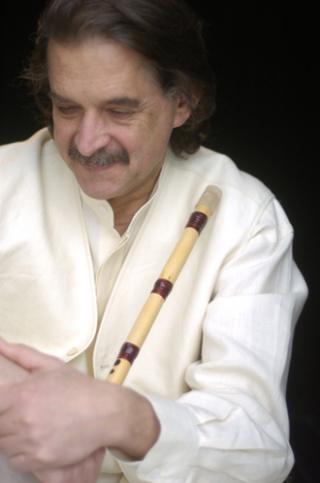A celebrated Iranian musician who’s achieved worldwide acclaim for his resurrection of classical Persian music will bring his ensemble and their haunting, passionate melodies to Vashon.
Hossein Omoumi, a world-renowned master of the ney, the reed flute of Iran, and his ensemble will perform at the Joan Hanna Barn Thursday, April 9. A talk begins at 7:30 p.m., followed by a performance at 8 p.m. Admission is by donation.
Omoumi, considered both a master of the ney as well as an innovator of the traditional Iranian instrument, has a connection to the Puget Sound region. From 2003 to 2005, he was a visiting artist in the ethnomusicology division at the University of Washington and performed at Meany Hall, Town Hall and elsewhere.
Jessika Kenney, an Island resident and vocalist who teaches at Cornish College of the Arts, began training with him after she first heard him perform at the UW five years ago and singing with him two years ago.
She was drawn to classical Persian music because of its beauty, she said, adding that it will sound particularly beautiful in the un-amplified and intimate space of Hanna’s Barn.
“It’ll be a bit more of a community event,” she added. “I’m really excited to bring him here.”
Omoumi, currently a music professor at the University of California at Irvine, has devoted much of his professional life to performing music that brings to life the lyrical works Hafez, Rumi and some of the other classical Persian poets.
He was born and raised in Isfahan, Iran, one of two centers of Persian classical music. He began playing the ney at age 14 and studied with Hassan Kassa’I, considered at the time the world’s greatest ney player.
He also earned a doctorate in architecture in 1972 from the University of Florence.
According to an article about him in The Seattle Times, Omoumi moved to Paris in 1984, after the Islamic revolution, in part because of the new regime’s hostility to music and in part to afford his two children better educational opportunities. There, he taught at the Sorbonne and worked as an architect.
He told the Times that he ultimately abandoned his architecture career for his love of the ney. But his skills as a designer came into play even with his music: He added a key mechanism to the open-holed ney, which enabled it to play a new note. He also designed tuning attachments for Iranian drums, including the goblet-shaped tombak and the daf, a frame drum, according to the Times.
On Vashon, he’ll be performing with an ensemble he’s been working with for about a year, Kenney said.
Kenney will sing. The other musicians include Amir Koushkani (tar) from Toronto, Kiya Tabassian (setar), Ziya Tabassian (tombak and daf) both from Montreal and Eyvind Kang (viola) of Vashon.
The musicians will perform “Voices of Spring,” based on a poem by Attar, a Sufi poet who was a predecessor to Rumi. The seven-section piece includes a refrain at the end of each section: “We are pure on the path of enthrallment, free from ourselves. We belong to God.”
Kenney said she thinks many on Vashon will appreciate the music, which has its own special beauty and richness.
“The tradition of it is very deep, and the sound has this incredible strength,” she said. “It’s similar to a human voice, but at the same time very intangible.”



